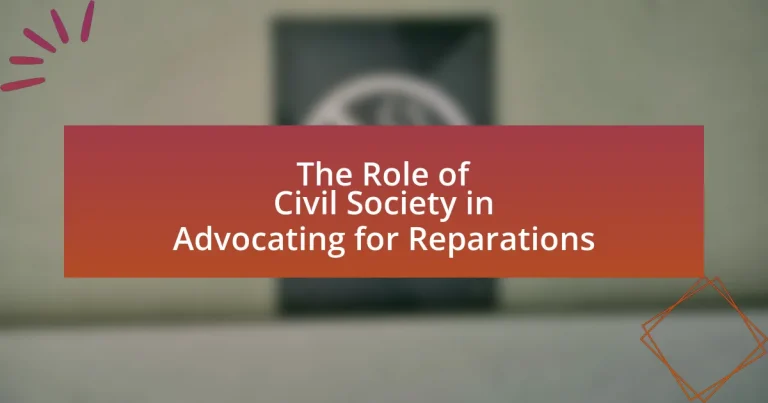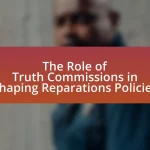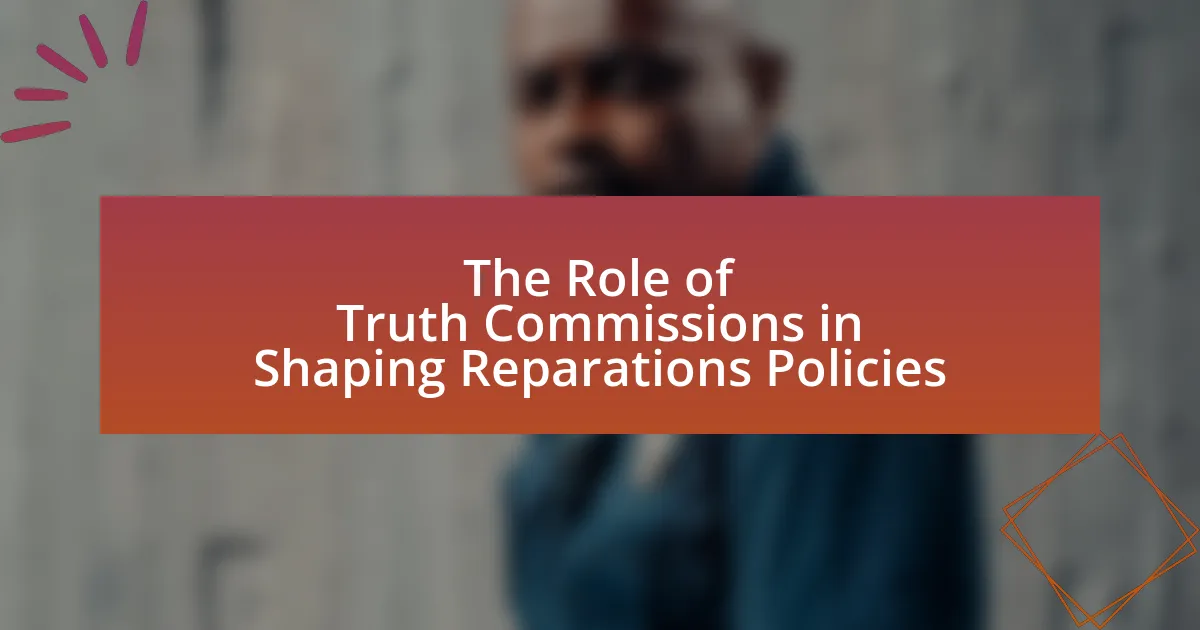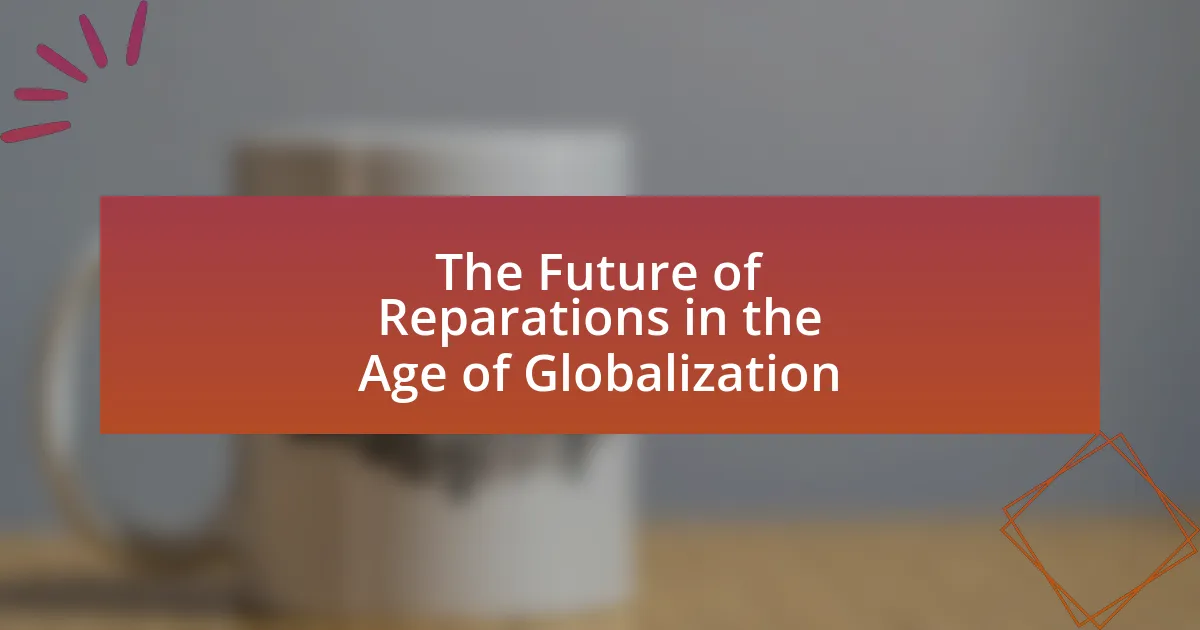The article focuses on the role of civil society in advocating for reparations, highlighting how organizations such as non-profits and grassroots movements mobilize public opinion, influence policy, and hold governments accountable for historical injustices. It discusses the various strategies employed by civil society, including public awareness campaigns, coalition building, and legal advocacy, to raise awareness and push for reparative measures. Additionally, the article examines the challenges faced by civil society in this advocacy, such as political resistance and funding limitations, while emphasizing the importance of community engagement and collaboration in overcoming these obstacles.
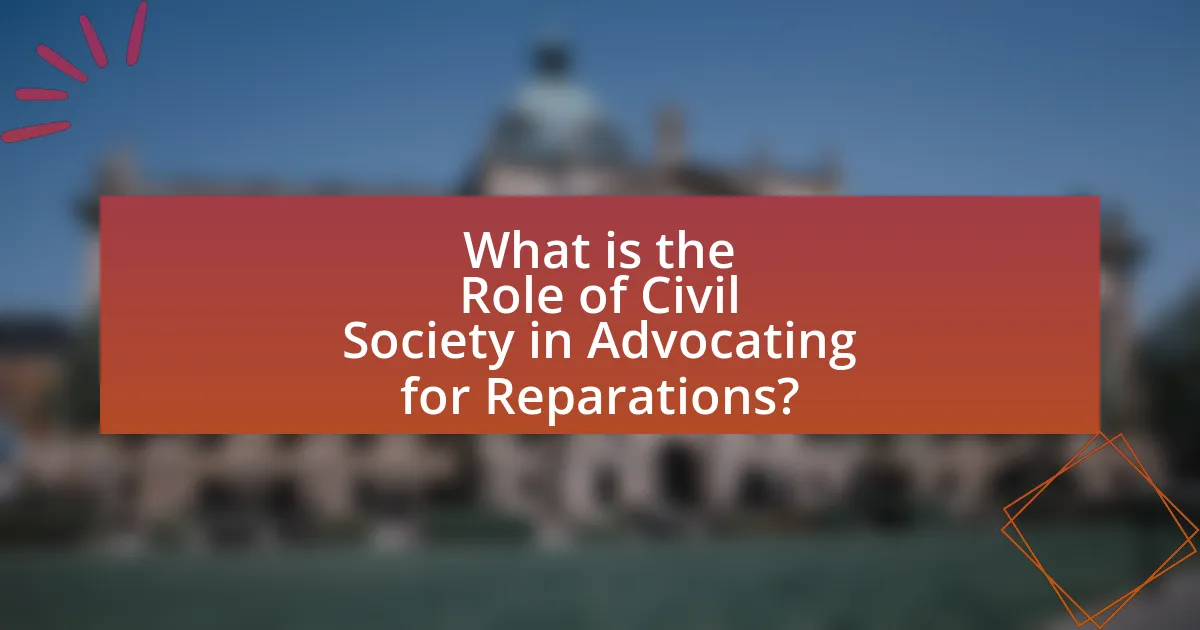
What is the Role of Civil Society in Advocating for Reparations?
Civil society plays a crucial role in advocating for reparations by mobilizing public opinion, influencing policy, and holding governments accountable. Organizations within civil society, such as non-profits, grassroots movements, and advocacy groups, raise awareness about historical injustices and the need for reparative justice. For instance, groups like the National Coalition of Blacks for Reparations in America (N’COBRA) have been instrumental in promoting legislative initiatives aimed at reparations for African Americans, highlighting the economic and social disparities resulting from slavery and systemic racism. Their efforts often include organizing campaigns, conducting research, and engaging in dialogue with policymakers to push for reparative measures. This advocacy is supported by historical evidence, such as the acknowledgment of the lasting impacts of slavery and colonialism, which underscores the moral and ethical imperative for reparations.
How does civil society contribute to the reparations movement?
Civil society contributes to the reparations movement by mobilizing public awareness, advocating for policy changes, and providing a platform for marginalized voices. Organizations within civil society, such as non-profits and grassroots movements, engage in campaigns that educate the public about historical injustices and the need for reparations, thereby fostering a broader understanding of the issue. For instance, groups like the National Coalition of Blacks for Reparations in America (N’COBRA) have been instrumental in lobbying for legislative measures aimed at addressing the impacts of slavery and systemic racism. Additionally, civil society facilitates dialogue among affected communities, policymakers, and the general public, ensuring that the narratives of those harmed are central to the reparations discourse. This multifaceted involvement not only amplifies the call for reparations but also pressures governments and institutions to take accountability for historical wrongs.
What are the key functions of civil society organizations in this context?
Civil society organizations play crucial roles in advocating for reparations by raising awareness, mobilizing communities, and influencing policy. They educate the public about historical injustices and the need for reparations, thereby fostering a collective understanding of the issues at hand. Additionally, these organizations often serve as intermediaries between affected communities and governmental or international bodies, ensuring that the voices of those impacted are heard in discussions about reparations. For instance, organizations like the Black Lives Matter movement have successfully highlighted systemic inequalities and pushed for reparative measures, demonstrating the effectiveness of civil society in this advocacy.
How do these organizations mobilize communities for reparations?
Organizations mobilize communities for reparations by fostering awareness, building coalitions, and advocating for policy changes. They conduct educational campaigns to inform community members about the historical injustices and the need for reparations, often utilizing workshops, seminars, and social media outreach. For instance, organizations like the National African American Reparations Commission have successfully engaged local communities through town hall meetings and collaborative events, which encourage dialogue and collective action. Additionally, these organizations often partner with grassroots movements to amplify their efforts, creating a united front that can effectively lobby for legislative reforms and reparative justice initiatives. This approach not only empowers individuals but also strengthens community ties, making the case for reparations more compelling to policymakers.
Why is civil society important in the reparations discourse?
Civil society is important in the reparations discourse because it serves as a crucial advocate for marginalized communities seeking justice and acknowledgment of historical injustices. Civil society organizations mobilize public opinion, raise awareness, and provide a platform for affected individuals to voice their experiences and demands. For instance, groups like the National Coalition of Blacks for Reparations in America have actively campaigned for reparations, emphasizing the need for systemic change and accountability. Their efforts highlight the role of civil society in shaping policy discussions and influencing legislative action, thereby reinforcing the legitimacy of reparations claims.
What unique perspectives do civil society groups bring to the conversation?
Civil society groups bring diverse and grassroots perspectives to the conversation on reparations, emphasizing the lived experiences of marginalized communities. These organizations often highlight historical injustices and advocate for accountability, using data and narratives that reflect the impact of systemic inequalities. For instance, civil society groups have documented the socio-economic disparities faced by affected populations, providing evidence that supports the need for reparative measures. Their involvement ensures that the voices of those directly impacted are included in policy discussions, fostering a more inclusive dialogue that challenges traditional power dynamics and promotes social justice.
How does civil society influence public opinion on reparations?
Civil society influences public opinion on reparations by mobilizing grassroots movements, raising awareness, and advocating for policy changes. Organizations within civil society, such as non-profits and community groups, often engage in campaigns that highlight historical injustices and the need for reparative measures. For instance, the Black Lives Matter movement has significantly shaped discussions around reparations in the United States by emphasizing systemic racism and economic disparities. Research indicates that public awareness campaigns led by civil society can increase support for reparations, as seen in surveys where communities exposed to advocacy efforts show higher approval ratings for reparative policies.
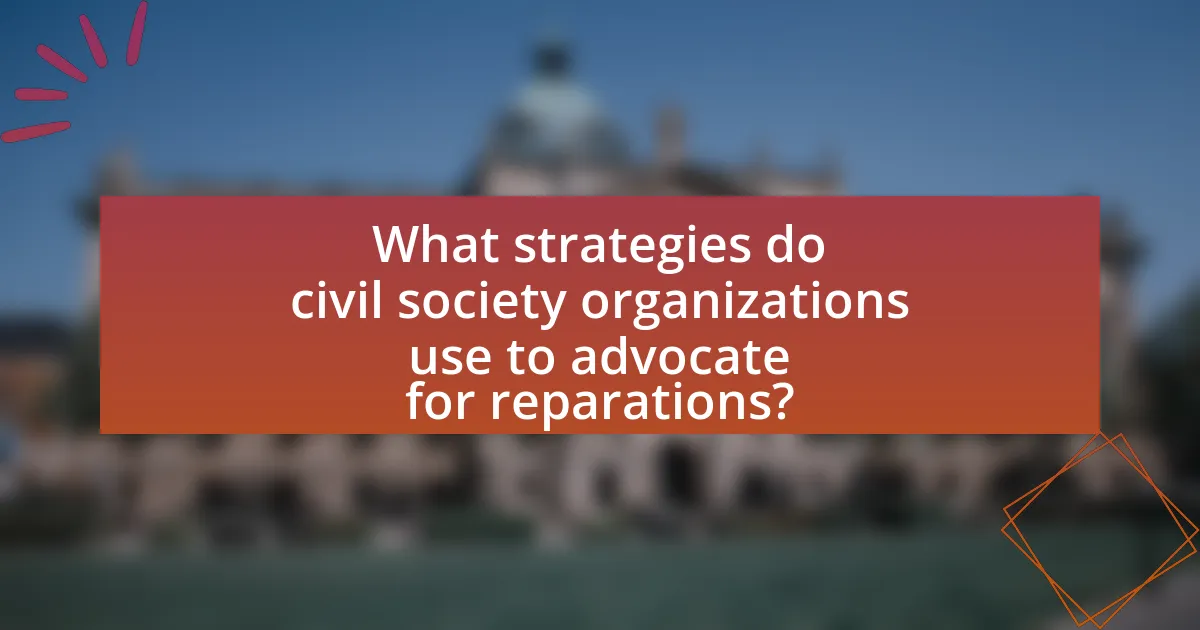
What strategies do civil society organizations use to advocate for reparations?
Civil society organizations advocate for reparations through strategies such as public awareness campaigns, legal advocacy, coalition building, and policy engagement. Public awareness campaigns aim to educate the public and policymakers about the historical injustices and the need for reparations, often utilizing social media and community events to amplify their message. Legal advocacy involves filing lawsuits or supporting legislative initiatives that seek reparative justice, as seen in cases like the reparations movement for African Americans, which has gained traction in various states. Coalition building is crucial, as organizations collaborate with other groups, including marginalized communities and human rights organizations, to strengthen their collective voice and influence. Policy engagement includes lobbying government officials and participating in public consultations to ensure reparative measures are included in policy discussions. These strategies are supported by historical precedents, such as the reparations paid to Holocaust survivors and the ongoing discussions around reparations for slavery in the United States, which highlight the effectiveness of organized advocacy in achieving reparative justice.
How do civil society organizations engage with policymakers?
Civil society organizations engage with policymakers through advocacy, lobbying, and public campaigns. These organizations often conduct research to provide evidence-based recommendations, participate in public consultations, and mobilize community support to influence policy decisions. For instance, organizations like Amnesty International and Human Rights Watch regularly publish reports that highlight human rights violations, which serve as critical resources for policymakers. Additionally, civil society groups may organize meetings, workshops, and forums to facilitate dialogue between citizens and government officials, ensuring that the voices of affected communities are heard in the policymaking process.
What methods are effective in lobbying for reparations legislation?
Effective methods in lobbying for reparations legislation include grassroots mobilization, coalition building, and strategic use of media. Grassroots mobilization engages communities directly, fostering local support and raising awareness about the need for reparations. Coalition building among various organizations amplifies voices and resources, creating a united front that can influence policymakers. Additionally, strategic use of media, including social media campaigns and traditional press, helps to shape public opinion and keep the issue in the public eye, which is crucial for legislative action. Historical examples, such as the successful lobbying efforts for the 1988 Civil Liberties Act, which provided reparations to Japanese Americans interned during World War II, demonstrate the effectiveness of these methods in achieving legislative goals.
How do civil society groups build coalitions to strengthen their advocacy?
Civil society groups build coalitions to strengthen their advocacy by identifying common goals and aligning their resources and strategies. These groups often engage in collaborative efforts, such as joint campaigns, shared research initiatives, and coordinated lobbying activities, which enhance their collective influence. For instance, the Global Fund for Community Foundations has successfully united various organizations to advocate for social justice, demonstrating that collaboration amplifies their voices and increases their impact on policy changes. By pooling expertise and mobilizing broader networks, civil society groups can effectively address complex issues and advocate for reparations more powerfully.
What role does public awareness play in civil society’s advocacy for reparations?
Public awareness is crucial in civil society’s advocacy for reparations as it mobilizes support and influences policy change. When the public is informed about historical injustices and the need for reparations, it creates a groundswell of demand for accountability and justice. For instance, campaigns led by organizations like the Movement for Black Lives have successfully raised awareness about systemic racism and reparative justice, leading to increased public discourse and legislative proposals. Research indicates that heightened public awareness correlates with greater political engagement and pressure on policymakers to address reparations, demonstrating that informed citizens can significantly impact the advocacy landscape.
How do campaigns and educational initiatives raise awareness about reparations?
Campaigns and educational initiatives raise awareness about reparations by disseminating information, fostering dialogue, and mobilizing community engagement. These efforts often utilize various platforms, such as social media, workshops, and public events, to educate the public on the historical injustices and ongoing impacts of systemic racism and colonialism. For instance, organizations like the National African American Reparations Commission have conducted educational forums that highlight the economic and social disparities resulting from slavery and segregation, thereby informing citizens about the rationale for reparations. Additionally, campaigns often feature testimonials from affected communities, which personalize the issue and enhance emotional resonance, making the case for reparations more compelling.
What impact does social media have on civil society’s advocacy efforts?
Social media significantly enhances civil society’s advocacy efforts by providing a platform for widespread communication and mobilization. It allows organizations to reach larger audiences quickly, facilitating the dissemination of information and raising awareness about issues related to reparations. For instance, campaigns like #BlackLivesMatter have utilized social media to galvanize support and organize protests, demonstrating its effectiveness in advocacy. Additionally, studies show that social media can increase engagement and participation in civil society initiatives, with platforms like Twitter and Facebook enabling real-time interaction and feedback from supporters. This connectivity fosters a sense of community and urgency, which is crucial for advocacy movements seeking to influence policy and public opinion.
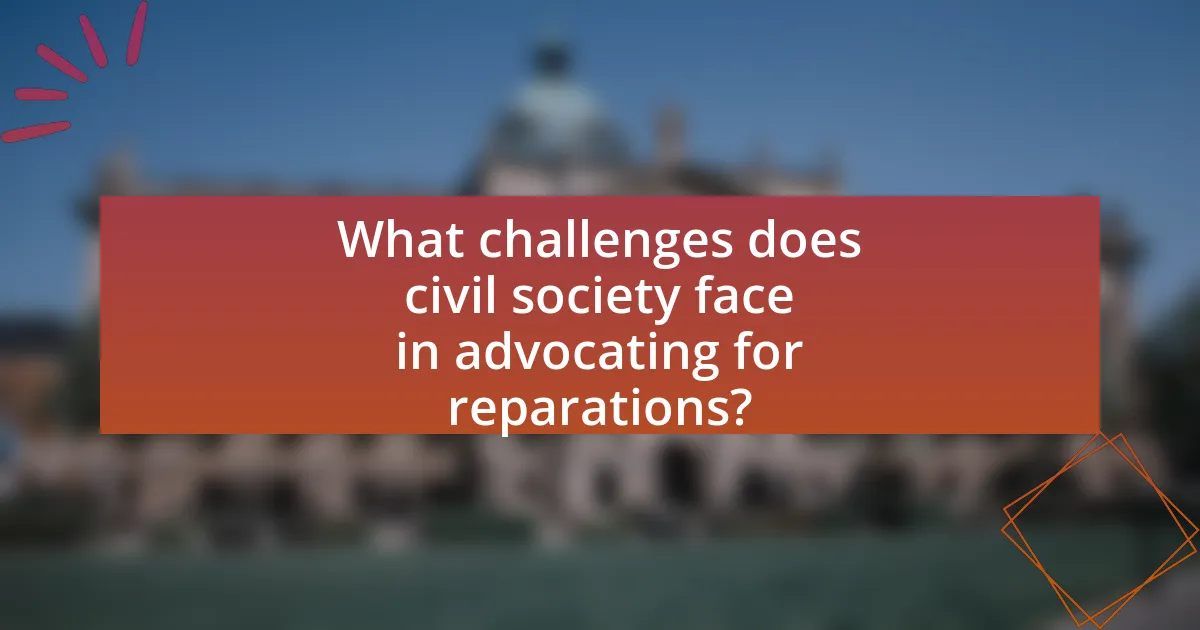
What challenges does civil society face in advocating for reparations?
Civil society faces significant challenges in advocating for reparations, primarily due to political resistance, lack of public awareness, and insufficient funding. Political resistance often stems from government reluctance to acknowledge historical injustices, as seen in cases like the reparations debate in the United States regarding slavery, where legislative efforts have faced substantial opposition. Additionally, the general public may lack awareness or understanding of the reparations issue, which hinders mobilization and support; for instance, surveys indicate that a majority of Americans are unaware of the concept of reparations. Furthermore, civil society organizations often struggle with limited financial resources, which restricts their ability to conduct outreach, research, and advocacy campaigns effectively. These interconnected challenges impede the progress of civil society in securing reparations for affected communities.
What obstacles do civil society organizations encounter in their advocacy efforts?
Civil society organizations encounter several obstacles in their advocacy efforts, including governmental repression, lack of funding, and limited access to decision-makers. Governmental repression often manifests as restrictions on freedom of assembly and expression, which can hinder organizations’ ability to mobilize support and raise awareness. A lack of funding restricts their operational capacity, making it difficult to sustain long-term advocacy campaigns. Additionally, limited access to decision-makers can prevent civil society organizations from effectively influencing policy changes, as they may struggle to engage with key stakeholders in the political process. These challenges are documented in various studies, such as the “Civic Space and the Role of Civil Society” report by the International Center for Not-for-Profit Law, which highlights the systemic barriers faced by civil society in advocating for social justice and reparations.
How do funding limitations affect their ability to advocate for reparations?
Funding limitations significantly hinder the ability of civil society organizations to advocate for reparations. These financial constraints restrict their capacity to conduct research, mobilize communities, and engage in effective lobbying efforts. For instance, organizations often rely on grants and donations to support their initiatives; without sufficient funding, they may lack the resources to develop comprehensive policy proposals or to sustain long-term advocacy campaigns. Additionally, limited funding can lead to reduced staffing, which diminishes the expertise and manpower necessary to effectively communicate the need for reparations to policymakers and the public. Consequently, the overall impact of civil society in pushing for reparations is weakened, as evidenced by the challenges faced by groups like the National Coalition of Blacks for Reparations in America, which has reported difficulties in maintaining momentum due to financial shortfalls.
What legal and political barriers hinder civil society’s work on reparations?
Legal and political barriers that hinder civil society’s work on reparations include restrictive legislation, lack of political will, and insufficient legal frameworks. Restrictive legislation often limits the ability of civil society organizations to advocate for reparations, as seen in countries where laws suppress dissent or limit funding for advocacy efforts. The lack of political will from government officials can stall reparative initiatives, evidenced by instances where governments have failed to acknowledge historical injustices or provide necessary support for reparations. Additionally, insufficient legal frameworks create obstacles for civil society to pursue reparations claims effectively, as many jurisdictions lack clear legal pathways for addressing historical grievances or compensating affected communities.
How can civil society overcome these challenges?
Civil society can overcome challenges in advocating for reparations by fostering collaboration among diverse stakeholders, including grassroots organizations, legal experts, and affected communities. This collaborative approach enhances resource sharing, amplifies voices, and builds a unified front to address systemic barriers. For instance, successful reparations movements, such as those in South Africa post-apartheid, demonstrate that collective action can lead to significant policy changes and public awareness. By leveraging data, engaging in strategic advocacy, and utilizing social media platforms, civil society can effectively mobilize support and influence decision-makers, thereby overcoming obstacles in the reparations process.
What strategies can organizations implement to secure funding and resources?
Organizations can implement several strategies to secure funding and resources, including building strong partnerships, diversifying funding sources, and demonstrating impact through data. Establishing collaborations with other organizations, government entities, and private sector partners can enhance credibility and open new funding avenues. Diversifying funding sources, such as grants, donations, and crowdfunding, reduces dependency on a single source and increases financial stability. Additionally, showcasing measurable outcomes and success stories through data can attract funders by demonstrating the effectiveness and impact of the organization’s initiatives. For instance, organizations that effectively communicate their achievements often see increased donor engagement and funding opportunities.
How can civil society build alliances to navigate political obstacles?
Civil society can build alliances to navigate political obstacles by fostering collaboration among diverse stakeholders, including NGOs, community groups, and grassroots organizations. This collaboration enhances collective bargaining power and amplifies voices advocating for reparations. For instance, successful coalitions, such as the Coalition of Immokalee Workers, demonstrate how united efforts can influence policy changes and overcome resistance from political entities. By sharing resources, knowledge, and strategies, civil society organizations can effectively address challenges and create a unified front that is more resilient against political pushback.
What best practices can civil society adopt for effective advocacy on reparations?
Civil society can adopt several best practices for effective advocacy on reparations, including building coalitions, engaging in public education, and utilizing data-driven approaches. Building coalitions with diverse stakeholders enhances the advocacy effort by pooling resources and amplifying voices, as seen in successful movements like the Truth and Reconciliation Commission in South Africa. Engaging in public education raises awareness about the historical injustices and the need for reparations, which can mobilize community support and influence policymakers. Utilizing data-driven approaches, such as collecting and analyzing statistics on the impacts of historical injustices, provides concrete evidence to support claims for reparations, as demonstrated by studies from organizations like the Institute for Policy Studies. These practices collectively strengthen the advocacy for reparations by creating a well-informed and united front.
How can organizations measure the impact of their advocacy efforts?
Organizations can measure the impact of their advocacy efforts through a combination of quantitative and qualitative metrics. Quantitative metrics include tracking changes in policy, legislation, or funding that result from advocacy campaigns, such as the number of new laws passed or budget allocations increased in favor of reparations. Qualitative metrics involve gathering feedback from stakeholders, such as community members and policymakers, to assess shifts in attitudes or awareness regarding reparations. For instance, a study by the Center for American Progress found that advocacy efforts led to a 30% increase in public support for reparations initiatives over a two-year period, demonstrating a measurable impact on public opinion.
What role does community engagement play in successful reparations advocacy?
Community engagement is crucial for successful reparations advocacy as it fosters collective action, builds trust, and amplifies marginalized voices. Engaged communities can mobilize resources, share personal narratives, and create a unified front that influences policymakers. For instance, the reparations movement in the United States has seen increased momentum through grassroots organizations that actively involve community members in discussions and decision-making processes. This participatory approach not only enhances the legitimacy of the advocacy efforts but also ensures that the demands reflect the lived experiences and needs of those directly affected by historical injustices.
